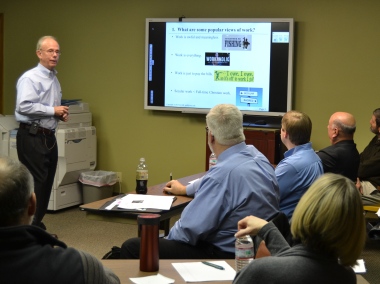
Look carefully then how you walk, not as unwise but as wise, making the best use of the time, because the days are evil. (Eph 5:15-16).
Does the work we do reflect the character of God?
We are blessed to have professor Art Hill (Carlson School of Management at the University of Minnesota), lead the first of our Everyday Faith seminars. The seminar series addresses the Sunday/Monday gap, in other words, helps us translate our faith from Sunday church to Monday work. (By ‘work’, we mean not just the work we do to earn a living, but all the kinds of work we do in everyday life — at home or in the community — at any stage of life, anytime, anywhere. By ‘work’ we mean the things we do when we’re awake.)
The topic for the first seminar is the theology of work and everyday faith. Theology simply means the study of God. Sometimes the best place to study God is in everyday life in the workplace. God is always at work (John 5:17). It has been said that ‘work’ in its various forms is mentioned over 800 times in the Bible. Jesus worked as a carpenter. It’s significant that the vast majority of Jesus’ teaching relates to the workplace.
Clearly, our work is important to God. The workplace is the crucible of faith – where, as Jesus’s apprentices, with God’s help, we learn to apply our faith. One of the best ways to learn is together, from real examples, so we can see clearly in our mind’s eye how other people live out their faith in everyday life — and how we might do so too.
“My friend and I love to pray,” Art said simply, “May we pray for you?”
One of the first things Art did in our initial seminar series (at St Luke’s Church in Faribault, MN) was get down to the practical details of implementation. I loved the immediacy of the ‘let’s-do-it’ approach! Art showed us how simple and easy it is to be used of God to bless someone in their place of work – a server in a restaurant, for example. Earlier that evening I had had the honor of dining with Art at a local restaurant. “My friend and I love to pray,” Art had said simply, addressing our server by name “may we pray for you?” Our server had had a really tough week, and wanted us to pray. I could see how deeply she was moved, and could sense the pain in her life. In my judgement, this was, by God’s providence, a divine encounter. It was our privilege to pray.
During our seminar, we discussed this simple, practical, praying-for-a-server example of living out our faith in everyday life. It’s an easy thing anyone can do anywhere – not just in a restaurant. We role modeled it, practiced it, reviewed it — and practiced it again. What a profoundly practical way of translating theology into everyday faith. Just do it! Be ready for God to use us for His purposes in every situation, and pray for those God puts in our path.
Keys to executing God-given roles effectively
God calls us to specific roles in everyday life (for example, as spouse, parent, employee, or as a leader in the community). Art addressed a key problem common to us all. We’re busy — so busy it’s hard to even think meaningfully about living out our faith in everyday life. One of Art’s areas of research is personal task management — called ‘Managing Me’. What a blessing to learn from a world expert on this crucial topic! Managing ourselves is crucial if we’re to be available for God’s use in everyday life. Art took us through six key steps we can take to manage ourselves and our work better:
- Aim. Make sure we are crystal clear about our purpose. We are followers of Christ (Mt 4:19) who walk not without aim (1 Cor 9:26a).
- Sort. Identify incoming work, eliminate low-value tasks (including emails!), and triage those that remain, with God’s wisdom, per James 1:5a.
- Select. Pick the best purpose-related, beneficial task to do. In Ephesians 5:15-16a, we are exhorted to be wise, making the best use of our time.
- Do. Focus on getting the selected task done. Don’t wander off into interesting distractions (like day-dreaming about vacations to Hawaii!) Proverbs 10:4 exhorts us to work diligently.
- Review. Reflect, evaluate, learn and improve. (Incorporate Review into daily meditation and prayer — see Psalm 139:23-24.)
- Break. Take a complete break. Get good sleep. The rhythm of work and rest is important. (See Ex 20:8-10.)
It’s clear that if we put these steps into practice for each of our God-given roles we can more clearly image God’s character in our work, and be far more fruitful and effective in our God-given vocations in everyday life.
This summary of the ‘Managing Me’ seminar is just a very high level overview — I’ve not done justice to the comprehensive excellence of Art’s work. We were left with examples that go into much more detail about how these ‘Managing Me’ principles can be applied in every conceivable situation, so there were takeaways for everyone. Also, Art gave us a number of insightful passages from Scripture showing what God says about managing ourselves and our work. It’s crucial that we manage ourselves so we can use God’s gift of time wisely for His purposes and glory. Effective self-management is step one for Everyday Faith.
“Pray for our server!” Art reminded me.
Art is a humble, godly man of prayer who raised Christ high, shared faithfully from God’s Word, and brought encouragement and wisdom to all seminar participants. I was completely absorbed. Before I knew it, time was up. What we learned together was how to manage ourselves and our time so we can be more effective for God’s mission. We learned how we can take simple steps to be the church more effectively (rather than being people who just ‘go to church’). And we learned how we can incarnate God’s love in the here-and-now of our everyday mission field, where, if we’re available to God, divine encounters happen.
Gracious Father, in the gospel you lavish us with your love. Launch us into your transforming story of redemption. Help us walk in the Spirit, and live out the Great Commandment and the Great Commission in our everyday lives and vocations. Our desire, as an act of worship, is to bring everything we do under the lordship of Christ, and in so doing, testify to the gospel of your grace. We pray these things in the name of Jesus — who has promised to make all things new, including me. Amen.
(This post was written by Warwick Alcock, Director of Strategic Operations, Village Schools of the Bible.)



